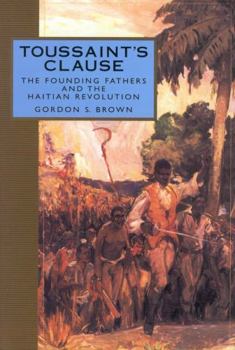Toussaint's Clause: The Founding Fathers and the Haitian Revolution
In its formative years, America, birthplace of a revolution, wrestled with a volatile dilemma. John Adams, Thomas Jefferson, Alexander Hamilton, and many other founding fathers clashed. What was to be... This description may be from another edition of this product.
Format:Hardcover
Language:English
ISBN:1578067111
ISBN13:9781578067114
Release Date:February 2005
Publisher:University Press of Mississippi
Length:321 Pages
Weight:1.50 lbs.
Dimensions:1.1" x 6.4" x 9.3"
Related Subjects
Diplomacy History Political Science Politics & Government Politics & Social SciencesCustomer Reviews
3 ratings
Excellent Overview of Haitian-US-French Relations
Published by Thriftbooks.com User , 16 years ago
This book is an excellent summary of the domestic and international politics at play in the ongoing drama of the 1790-1804 revolution in St. Domingo (the name for what later became Haiti.) The author describes the southern fears of American slaves being inspired to revolt like the St. Domingans and how these fears tempered the sentiments of key Revolutionary fathers like slave-owning Thomas Jefferson, who for some reason continues to get a free ride from modern historians despite his clear and balatant racism. The book to a lesser extent is concerned with developments in Revolutionary France, but provides enough background to appreciate what was happening on the island itself. The primary concern of the US in the beginning was trade and profit with the revolting slaves. Later, when relations with France became tense as a result of naval insults to our merchant vessels, passive support for the rebels became a key component of America's strategy. Later still, when it seemed that Napoleon had grand designs for a North American Empire centered in Louisiana, prolonging the ongoing quagmire in St. Domingo served the purpose of exhausting French resources to the point the ambitious First Consul threw up his hands and sold the young Republic a huge swath of land that began our Manifest Destiny. After the French withdrew from Haiti, US interest dissolved, with no enthusiasm at all for recognizing the first example of blacks overthrowing their white owners. Indeed, not until after our Civil War started did this country finally and formally recognize Haiti as an independent state (some 40 years after France itself did so.) All in all, a must have for any student of the early American and French Republics, the Napoleonic Wars, Haiti or slavery.
American policy debates are the stars of this work
Published by Thriftbooks.com User , 17 years ago
Scholars, novelists, and playwrights have examined the slave revolt that violently and abruptly ousted the French plantation system on the Caribbean island of Saint-Domingue during the 1790s from the viewpoint of the slaves, in the context of the French Revolution, through the eyes of the charismatic leader Toussaint Louverture, and from other perspectives. Treatment of U.S. foreign policy toward the embattled colony has received chapters and articles within larger studies. Gordon S. Brown, however, commits a full-length study of American policy toward Saint-Domingue in his accessible work, Toussaint's Clause: The Founding Fathers and the Haitian Revolution (Jackson: University Press of Mississippi, 2005). Brown's thesis is straightforward: competing U.S. economic interests between northern merchants and shippers and southern slaveholders "determined the main lines of America's Haitian policy" (6). He sustains this economic view throughout the work while introducing the reader to the myriad of American, Dominguan, French, and British voices that influenced the resulting and fluctuating policies. Brown handles the complexities of U.S-Dominguan diplomacy while never losing focus on the overriding economic determinants. Toussaint's Clause follows the chronology of events and provides the reader a firm overview of the revolution, which lasted from 1791 to 1804. Internal American policy debates are the stars of this work. Brown's use of primary source correspondence and extended quotes reveals how early American power players like Washington, Adams, Jefferson, Hamilton, Madison, and Timothy Pickering confront the issues of domestic politics, southern slavery, and the French Revolution. He highlights the influence of French ministers and touchy relations with Great Britain on American thinking toward the island. Brown concludes that U.S.-Dominguan trade played an important role in almost every policy discussion of what to do about the rebel slaves. Though three presidential administrations enacted different policies toward Saint-Domingue, one thing is clear from Brown's work: at least one administration maintained a full-fledged foreign policy with an island of black ex-slaves some 65 years before the end of slavery in America. John Adams and his cabinet maintained diplomatic correspondence with Louverture, provided the black regime financial assistance, and the nascent U.S. navy engaged the forces of Louverture's Dominguan rival Andre Rigaud during a hostile struggle for Saint-Dominguan leadership. Brown explains eighteenth-century American diplomatic involvement with a black colony in terms of international politics and trade economics. A primary force behind the policy was careful consideration of its implications for northern merchants and its impact for southern slaveholders. The work helps us better understand the importance of trade and slaves (as commodities and laborers) in the early republican economy. Only one other autho
The Infant US Politics & Foreign Affairs- A Grand Survey
Published by Thriftbooks.com User , 19 years ago
This short, articulate survey of the the newborn United States' issues with the St. Domingue (the putative Haiti) touches on virtually everything: The French Revolution; the Louisiana Purchase, the early Federal-state struggles in the United States; the founding fathers' ambivalence about the institution of slavery; the often overriding role of the private sector in American diplomacy , Caribbean piracy in the 18th and early 19th century. All of this and more seen through the lens of the Haitian slave revolt and the vagaries of the historic changes in French (and western) society engendered by the French revolution. A great read that makes one hunger for more of all the issues discussed.






